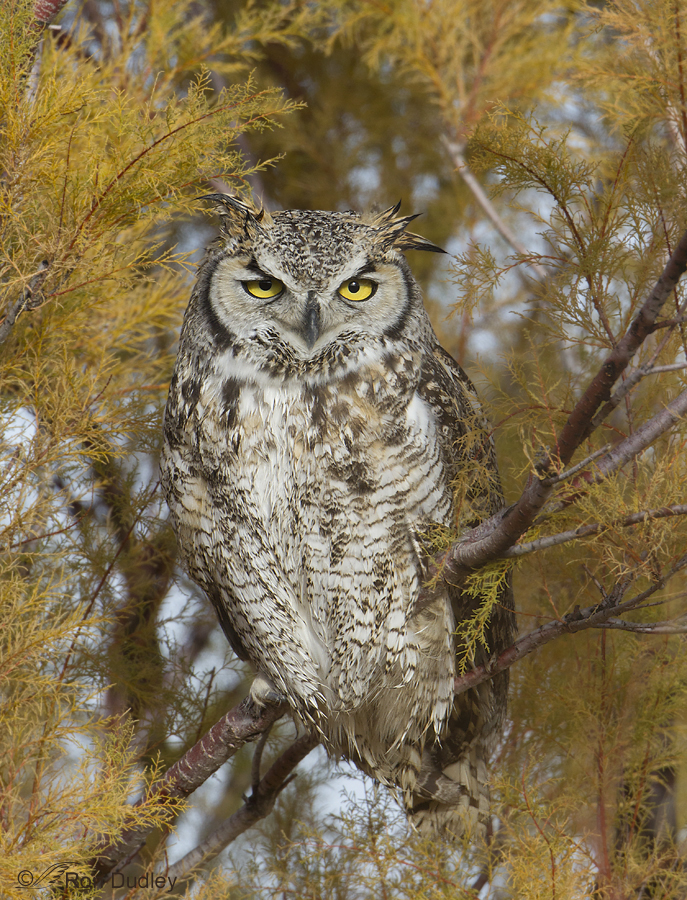Typically when I find a Great Horned Owl in a natural setting it’s so deeply buried in the tree or foliage that it can barely be seen. This is a deliberate behavior, at least in part to avoid mobbing birds of many species. Crows, for example, will invariably mob an exposed GHO, pursuing it from tree to tree and calling out to other crows to recruit them to join in.
1/800, f/8, ISO 500, 500 f/4, 1.4 tc, natural light, not baited, set up or called in
This owl, and one other, perched in the tamarisk for about a week but on most days they were virtually impossible to see unless you knew where to look. But on two cold, early mornings I found one of them in this spot where it was exposed to the warming rays of the sun. Its breast and belly feathers are wet, as are the drooping ear tufts.
These birds sleep during much of the day but their slumber is light and alert as evidenced by their ear tuft (“horn”) movements in response to any slight sound, even with eyes closed – a behavior that’s interesting to observe if you’re lucky enough to be sufficiently close to a sleeping owl.
Ron



A stunning image! Like others have mentioned, the color of the eyes and the tree complement each other so well! And the lighting,details on the owl and DOF are just marvelous! Your patience in searching for a clear shot was well rewarded. Congratulations on capturing this amazing photograph!
Thanks very much, Susan. I’m delighted that you like it.
I do love owls. I have been absent from your blog for far too long and to come back to see owls is a gift. Thank you Ron. It must have been a delight for you when the owl moved into a position where you could see it and photograph it without it being obscured by vegetation. As it was a delight for me to see it here.
I’ve missed you Elephant’s Child and been hoping that things in your world are improving. A big welcome back!
very nice
What I find so striking about this image is not only the owl itself, but the colour harmony created by his yellow eyes and the the yellow foliage. It’s just spectacular.
Thanks very much, Maria. I like the colors here too.
All of your photos are breathtaking but the owls hold a special place in my heart. I am watching a pair of Barn Owls. The female just laid 5 eggs, but the third egg was something I may never see again. She was positioned with her back end to the camera and we were privileged to watch as the egg came out. It was amazing to see. Thank you again for sharing all of your photos with us.
Wow, Debbie! That must have been something.
Is this a Montana or Utah owl, Ron? Just curious, as it’s so much lighter than our Pacific NW Great Horneds, at least those from the western part of our state. Their infinite variety is fascinating – I’ve seen nearly white ones up in Edmonton, Alberta; really sandy-colored ones from eastern Oregon … and ours are really dark. Great adaptability!
Louise, sorry – I should have mentioned that. This owl is a Utah bird – photo taken on Antelope Island.
Just realized, tamarisk must be the name of the tree. Sorry. Migraine today that doesn’t let me think through things.
Jolie, Yes, tamarisk is an invasive that causes some problems but they do provide some shelter and nesting sites for birds.
This is now my favorite picture of yours! Absolutely love. Where is Tamarisk? Just curious.
Another superior shot and informative commentary. Thanks so much for sharing!
Thanks, Charlotte.
This photo has me gazing at it mesmerized, and I’m not even really looking at the eyes! The textures and colors leap off the page at me, and I really wish I could see the whole pic at once without scrolling. The feathery foliage and the damp foliage-y feathers, the eye and foliage color (I like colors…), the bark and darker feathers, the various highlights on various parts of plant and animal…I loved the 4+ barn owls on the swingset for its humor (humanizing again), I love this one for its hush. Thanks, Ron!
Thanks very much, Chris. I just sent you a smaller version of the image so you don’t have to scroll…
The yellow of their eyes is always astounding to me.Thanks Ron.
There’s just something about “owl eyes”, that’s for sure, John.